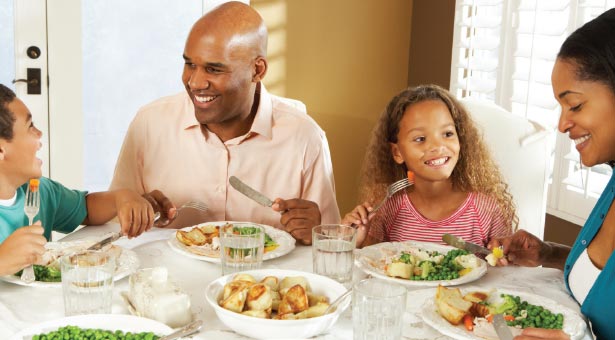Meals Together Strengthen Family Ties
The Hour That Matters Most
By Les and Leslie Parrott | Photo by iStockphoto

It used to be that people in our profession — psychologists and family therapists — would ask clients to describe their family dinner tables from childhood. It was a relatively quick and reliable way to determine the general tenor of a home. We would even ask them to draw the shape of the table and to place themselves, their parents, and their siblings around it. We'd have them describe a typical mealtime, including topics of conversation.
Some clients would recall many details and evoke a word picture of engaging interactions. Others would recall only vague and fleeting memories. Their childhood gatherings around the dinner table were either nonexistent or nearly irrelevant. Either way, therapists saw a strong relationship between the love in a home and the richness of the family dinner table.
But somewhere during the 1970s, the question counselors were asking their clients about their childhood dinner table became more and more irrelevant, as family dining decreased dramatically over the next 30 years. With both parents working and the kids shuttling between sports practices or glued to their computer screens at home, finding a time for everyone to sit around the same table, eating the same food, and listening to one another, became more quaint than customary.
The revolutionary social, economic, and technological changes in family lifestyles over the past decades made the therapeutic question obsolete. But no longer. Psychologists and therapists are bringing the question back. Why?
Because a mountain of research is emerging, and the mysterious value of a consistent family dinner hour can no longer be ignored.
Consider this: Study after study shows that the more often families eat together, the less likely kids are to smoke, drink, do drugs, get depressed, develop eating disorders, get overweight, or consider suicide — and the more likely they are to eat their vegetables, learn big words, do well in school, delay having sex, know which fork to use, and feel loved by you. And that's just for starters.
On top of all the dinnertime studies over the past decade that have shown a myriad of payoffs for your kids, there are newer studies showing the payoff for parents — especially working moms. How could this be? Because this family ritual reduces conflict and strain from working long hours. It's true. Parents, not just kids, benefit from time spent eating together around the table.
We're not saying that having family dinners is the answer to all your problems. We're not saying it eliminates all your stress. Far from it. The point is that even if you work long hours and shuttle your little ones from one activity to the next, you can still reap the amazing benefits of the hour that matters most.
 Les and Leslie Parrott are the authors of The Hour That Matters Most, a No. 1 New York Times best-seller, and co-directors of the Center for Relationship Development in the School of Psychology, Family, and Community at SPU.
Their long list of books includes Saving Your Marriage Before it Starts, Love Talk, and Trading Places. Learn more at lesandleslie.com.
Les and Leslie Parrott are the authors of The Hour That Matters Most, a No. 1 New York Times best-seller, and co-directors of the Center for Relationship Development in the School of Psychology, Family, and Community at SPU.
Their long list of books includes Saving Your Marriage Before it Starts, Love Talk, and Trading Places. Learn more at lesandleslie.com.
